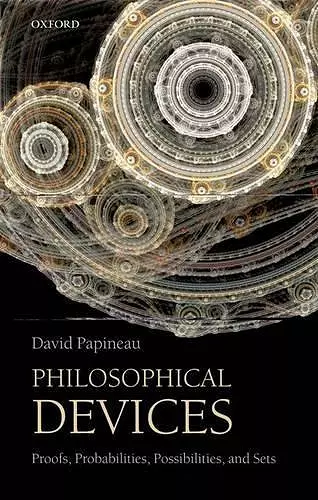Philosophical Devices
Proofs, Probabilities, Possibilities, and Sets
Format:Paperback
Publisher:Oxford University Press
Published:4th Oct '12
Should be back in stock very soon
This paperback is available in another edition too:
- Hardback£61.00(9780199651726)

This book is designed to explain the technical ideas that are taken for granted in much contemporary philosophical writing. Notions like 'denumerability', 'modal scope distinction', 'Bayesian conditionalization', and 'logical completeness' are usually only elucidated deep within difficult specialist texts. By offering simple explanations that by-pass much irrelevant and boring detail, Philosophical Devices is able to cover a wealth of material that is normally only available to specialists. The book contains four sections, each of three chapters. The first section is about sets and numbers, starting with the membership relation and ending with the generalized continuum hypothesis. The second is about analyticity, a prioricity, and necessity. The third is about probability, outlining the difference between objective and subjective probability and exploring aspects of conditionalization and correlation. The fourth deals with metalogic, focusing on the contrast between syntax and semantics, and finishing with a sketch of Gödel's theorem. Philosophical Devices will be useful for university students who have got past the foothills of philosophy and are starting to read more widely, but it does not assume any prior expertise. All the issues discussed are intrinsically interesting, and often downright fascinating. It can be read with pleasure and profit by anybody who is curious about the technical infrastructure of contemporary philosophy.
an engaging, genuinely expository text. It is hard to imagine a better execution of the project of introducing the basics of technical philosophy non-technically. ... an invaluable addition to undergraduate reading lists, and I certainly will make use of it in my teaching. * A.C. Paseau, Philosophia Mathematica *
The book is a clear and straightforward introduction to technical methods and concepts that have widespread applications in analytic philosophy and other sciences. For this reason it is an excellent introductory text. * Arif Ahmed, University of Cambridge *
Papineau has written a suprising book. Though small in size it can serve as a template for a variety of undergraduate philosophy courses as instructors choose to emphasize various parts of the presentation. The text is clearly and accurately written. The pedagogy sets out concepts in a sequential order that works well. This is a highly recommended text. * Michael Boylan, Professor and Chair, Philosophy, Marymount University, Virginia *
This is a very good book for students learning about philosophical methods. The sections are concise, easily accessible and well well-written. I've been looking for a book like this on philosophical methods for a while now and this is one of the few that I've found so it is covering a needed gap in the market. I will definitely be recommending it to my library for purchase and to students. * Emily Ryall, University of Gloucestershire *
ISBN: 9780199651733
Dimensions: 203mm x 135mm x 12mm
Weight: 258g
224 pages